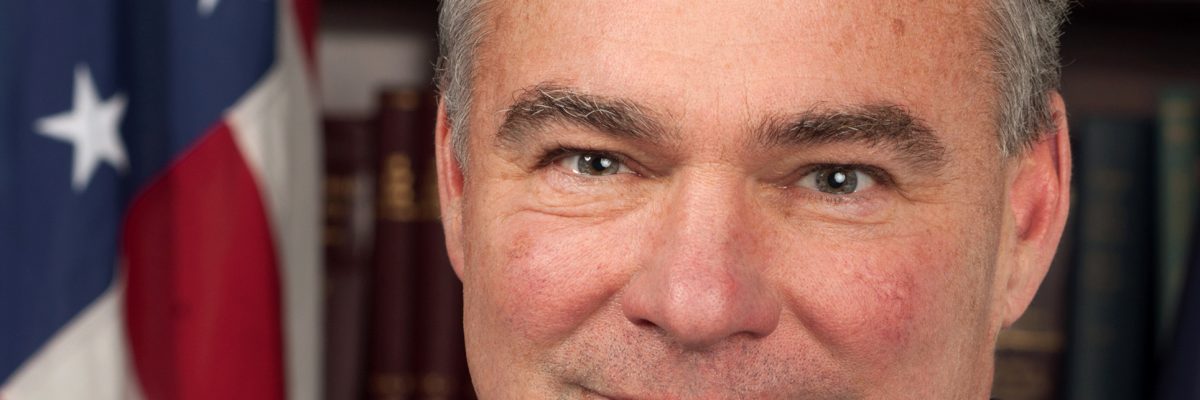
Dear Tim:
How are you? National campaigns are such a strain on one’s health. Hope you’re getting lots of sleep and taking vitamin C.
I’ll presume you were of sound mind the other day when you predicted, to an audience of gay-rights activists who are giving you money, that the Catholic Church will someday change its teaching that marriage is only between a man and a woman.
By all accounts, you are a card-carrying, fully initiated, regularly practicing co-religionist of mine—a brother in the Lord. I don’t know you personally, so I see no reason to doubt either your conviction or your sincerity when you say things like this.
In fact, it makes perfect sense to me. Your Catholic formation took place during a time of change and experimentation in the Church, and some of the 1970s Jesuits who formed you were at the vanguard of that upheaval. To someone with your background, doctrinal immutability probably seems more like a general guideline than something absolute. And haven’t we seen Christian denominations around the world radically adjusting their stance on moral issues? So I understand why you see a change in the Church’s marriage teaching as something that’s not only possible but perhaps inevitable.
And of course, you’ve also kept company with other Catholic politicians who spent their careers justifying their dissent from certain Catholic teachings. Undoubtedly you picked up some of the mental reservations and logical gymnastics they used: citing the separation of church and state or the supremacy of individual conscience, or even claiming—as you just did—that they were actually being faithful to some deeper gospel principle. (This is probably why you dissent from the Church on other issues, like abortion and the male-only priesthood.)
Why shouldn’t you disbelieve these teachings with a clear conscience? Polls of Catholics show you’re hardly alone. Your pastors and bishops have never corrected you. And you even cite the pope (“Who am I to judge?”) as an inspiration. Sure, he has made other statements opposing same-sex marriage, but clearly he’s part of the arc of progress that will bring Catholic teaching to the Right Side of History.
So let’s assume that you’re so wholly a product of your formation and environment that your ignorance is of the blessedly invincible variety. While I have your attention, let me briefly plant in your ear three principles that just might begin to relieve you of it.
Principle 1: Church teaching on faith and morals cannot change (or if it does, we can all just pack it in).
The reason we’re Catholic in the first place is that we believe Catholicism is where the truth is. The Church certainly claims this about itself. It says that it is the recipient, guardian, and transmitter of truth from God about what we should believe and how we should live if we want to be happy forever. If that’s not what we’re looking for, then we signed up at the wrong table.
The Church also says that not only did God give it these truths, he also protects it from messing them up. So the Church can’t say in one century that Jesus is God and a century later that he’s just a man, or that the Eucharist is his body and blood yesterday but just a sliver of bread tomorrow, and still have any claim to authority. Jesus is either God or he isn’t; the Eucharist is either his body and blood or it isn’t; and marriage and conjugal love either require one man and one woman or they don’t.
Principle 2: Doctrine, not discipline
Now, Tim, you’re probably thinking to yourself, “But Catholic teaching does change. We used to pray in Latin, but now we pray in English. We used to abstain from meat on Fridays, but now we don’t. The nuns taught me that unbaptized babies went to limbo, but no one says that anymore.” And so on.
In reply, I would point to the distinction between doctrine and discipline. The first refers to matters of Christian belief and behavior rooted in unchangeable truths about God, man, and the universe. These are by their nature fixed, even if our understanding of them, and the language we use to express them, may develop over time.
The second refers to, well, almost everything else the Church says and does: how to pray, how to offer the sacraments, when to fast and when to feast, how ecclesial matters are organized and administered, and so on. Such matters can change. In fact, they should change sometimes if the Church wants to effectively serve and convert an ever-changing world.
Another thing that can change is the way the Church copes with mysteries that are beyond the scope of the truths it received. For example, over the centuries Catholic thinkers have argued for different theories about the fate of babies who die unbaptized (one of them being the state of natural happiness called limbo), but these theories come and go. And that’s okay—the Church has never claimed to have the single right answer about limbo, and we don’t need the answer in order to to be saved.
The Church does claim to have the single right answer about sex and marriage, and we do need it.
Principle 3: Beware of false mercy
Last thing, Tim. You have defended your dissent from Church teaching by appealing to Christian mercy and fairness. I mean, how can a religion preach mercy and justice while denying both to gay people who just want loving relationships with each other?
I’d suggest you stop and think about that for a second. Are you (and other Catholics who in the past decade say they’ve discovered a gospel mandate in favor of same-sex marriage) the first to figure this out? Has Christ’s Church really been engaged in not just systematic injustice towards homosexual persons for 2,000 years but also mass self-delusion? If that were true, all the Church’s historic sins and failings would pale in comparison.
Sheldon Vanauken once argued that if women were actually able to be priests, then Christ wasn’t God. His reasoning was that if the Church had unjustly denied ordination to half the human population for two millennia, that injustice would be so rank that the Church could not be of divine origin, and since its origin is Christ, then Christ couldn’t be God.
A similar argument can be made regarding same-sex marriage. If for twenty centuries the Church has completely biffed not only an important question of sexual morality but also one of its sacraments, then it’s not what it claims to be and hence neither was Christ.
That’s the justice part. What about mercy? Tim, I believe you when you say you’re a man of mercy. I can understand why someone might think that it’s merciful to provide a legal path for persons with same-sex attraction to establish intimate bonds.
But mercy can have a false face. An addict, for example, may ask for just one more hit to ease the shaking and the pain. Denying it to him would cause suffering and so appear to be unmerciful. But it’s actually a necessary part of bringing him to recovery and health. That more difficult work is the true mercy.
If the Church is right in what it teaches about sex and marriage; if God gave us those teachings not to be burdens but to make us free and fulfilled in this life and blessed forever with him in the next; if by calling ourselves “Catholic” we mean we believe these things, then we’ll see that using the law to confirm persons with same-sex attraction in a way of living that leads them away from God and from true happiness is not real mercy but a counterfeit.
More than any other reason, that’s why the Church will not and cannot change its teaching on marriage. To do so would be contrary to the mercy of Jesus, who founded the Church and leads it still.



